How the delay of analysis puts the naive European leaderships out of play
by Glauco D’Agostino
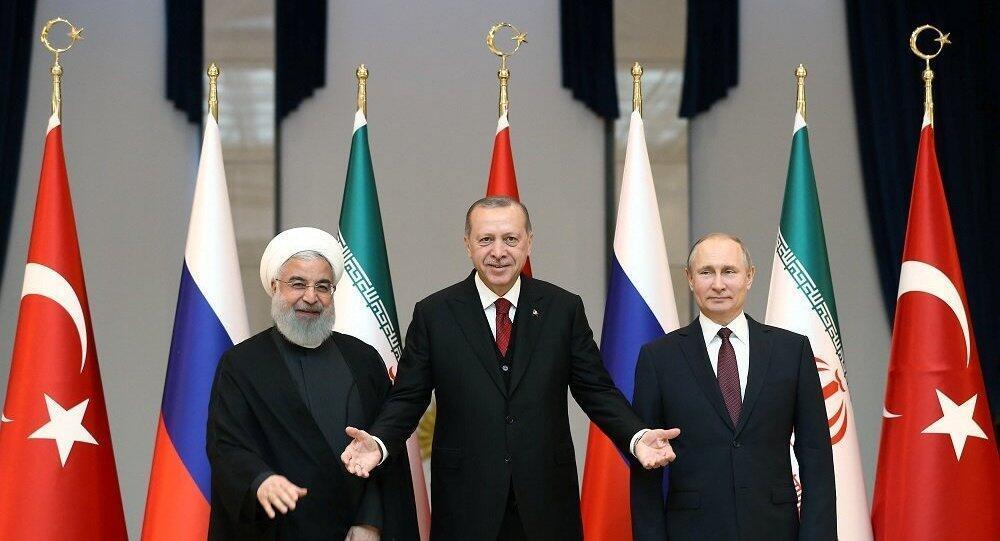
As for me, my foreign policy view is pretty ethical, it’s a fact. A serious flaw, someone disputes me; out of reality.
I will devote this note to geopolitics which, as savants are teaching me, is based on territorial economic interests. Thus, I follow this line.
 To start, let’s read the concreteness of the Middle East and North Africa to get bearings on today’s most serious crises, that is, those following General Sulaimānī’s assassination (oops, ethical!) deletion, and the worsening of the Libyan crisis:
To start, let’s read the concreteness of the Middle East and North Africa to get bearings on today’s most serious crises, that is, those following General Sulaimānī’s assassination (oops, ethical!) deletion, and the worsening of the Libyan crisis:
- The United States is leaving the area because it no longer has national interests to defend on the ground. It solved at home the energy supply problem and doesn’t want any longer enter the rhetoric of human rights (markedly an ethical issue and consequently out of the harsh reality, we have placed it as the basis of the reasoning);
- The U.S. isolationist and protectionist stances have been at the basis of Trump’s electoral program. He is now consistent with the commitment to its voters pursuing a straightforward foreign policy approach;
- Russia and Turkey, with the concurrence of Washington, are openly filling the void the U.S. left. The former thus become the privileged interlocutors for any actor who wants to claim rights (oops, ethical!) interests on any part of the area;
- This particularly worries the Tel Aviv-Riyāḍ-Cairo axis, which bases on a geo-political agreement (sure not a religious one!) that Washington approved. By now, if it still wants to exist, must have Moscow and Ankara assent (not unlikely in the balancing act);
- The other dominant rhetoric, the West as an alleged beacon of civilisation, is falling. It is an ideological fabrication born to legitimise the convergence of interests that replaced early deprecated imperialism just by changing its name;
- The influence of the European powers (two of which sit by right in the UN Security Council), is decreasing, a consequence of the end of a world order dated 100 years ago (or at best 75 years ago). This order had determined the birth of new countries as Libya, Egypt, Sudan, Israel, Jordan, Lebanon, Syria, Iraq, Saudi Arabia, Kuwait and all the Arab potentates of the Gulf except Oman;
- The European Union’s political claim to have a say with unambiguous will is falling as a snowman when the snow melts away. Finally, it unveils it’s not a political body based on deep values (oops, ethical!), on shared interests but a supranational economic entity where glue is euro, which not even all its members share;
- Among the powers of the European Union, France alone has nuclear deterrence, that is, the ability to sit down in decision tables with full legitimacy (oops, ethical!), with full authority to defend its broad interests, from West Africa to Algeria, Libya, Lebanon and so on.
Geopolitical experts do not agree to admit all these easy shreds of evidence are true. At most, you can reach a consensus on one or two of these issues, not on all. They are evidence, yet!
It’s a question of method, ça va sans dire. The accuracy of the analysis depends on the premises and, consequently, affects the conclusions drawn from them. But if you can say this and not that other, if any political-academic statement must pass anti-terrorism censorship or even opens the door to harsh sanction threats, then it is propaganda that prevails, not analysis.
The charge to geopolitical experts (not all of them!) is of using a code of silence. Prefixing conclusions to analysis is not only dishonesty (ethical concept), it is incompetence or, at best, pursuing partisan economic interests. So biased.
Let’s analyse the uncomfortable evidence proposed.
The line Washington held earlier this year seems to deny the United States is leaving the Middle East and North Africa. This stance did not start with Trump. Obama adopted it (perhaps clumsily) in the war theatres of both Afghanistan and Syrian-Iranian area, where he eased the American imperial grip announcing talks with the Taliban, withdrawal of troops, closure of Guantánamo. All these initiatives were unsuccessful for an American establishment resistance certainly not by the will of his international counterparts. The only exception was the JPCOA, formerly achieved and failed today, which aimed to bridle Iran under international nuclear rules, thus making it less worrying for US allies. Anyhow, a view of disengagement. With Trump in office, this disengagement is again a priority, albeit through methods that contradict those previously adopted. However, the design didn’t change, looking for military withdrawal in a logic of continuity concerning interests not political in their nature, not only functional to any party, but useful to the country’s economic structure. Other than human rights!
If you look further back in recent history, you will see that the US did run (and do, yet) a very realistic foreign policy towards the Āyatollāhs, taking note of their reputable economic and military strength. Beyond mutual verbal violence, Iran received a boost in conquering a substantial regional role. I wrote in April 2017: “Basically, thirty years of US policy in the Middle East led to the weakening or removal of all real and potential, institutional and political enemies that might limit its expansion in territorial influence. To the east, the Tālibān (founders of an Islamic Emirate, but a Sunni one) and al-Qāʿida (which had contributed to the victory on the USSR, but made up primarily by Wahhābi fundamentalists). To the West, a secular and Ba’athist (as indeed Syrian Asad rulers) Iraq of Ṣaddām Ḥusayn, a slayer of Shiites […] Since September 11th, the US has started fighting the Sunni Islamist fundamentalism, targeting, after Ṣaddām Ḥusayn, even the Ḥaqqānī network in Pakistan and the Islamic State in Syria and Iraq” (https://www.islamicworld.it/wp/trump-and-iran-the-lessons-coming-from-history/).
If we pay attention to the main lines of foreign policy, Trump’s arrival has only accelerated a process of stabilisation delegated to those regional powers showing to be able to. He didn’t do it stealthily but by submitting a strict election platform as a basis of his debates with Mrs Clinton. But four years are too far away for analysts and news chasing the record of the day. This does not absolve Trump for the misdeeds he confessed, mind you. The topic would raise morals which, as we said at the beginning, secular sensitivity rejects as out of geopolitics. And here we want to follow a geopolitical path.
Therefore, the recognised heirs to the US are Russia and Turkey in the role of Middle Eastern relations adjustments and everyone has to deal with them. It is realism and not theory, with all due respect to those who still seek inspiration in the ideological leanings of the past. The proof is the agreement on the Syrian after-ISIS balance, approved and blessed by Washington as a factor of stability. It means acknowledgement of the Iranian influence over the Shiite Crescent (Iraq, Syria and Lebanon) and protection of Turkish interests in northern Syria and Iraqi Kurdistan. It also means formal notice of Iran-Turkey creeping geopolitical disagreements, which have their roots far back in history when Turkey was a Sultanate and Iran was ruled first by Safavid and later Qājār dynasties; and Baġdād passed from one another control depending on the military fortunes of the contestants.
This arrangement bases on the supervision of Moscow, which does not need to justify its role through the evocation of human rights. This is geopolitics, heck! It is about safeguarding peace and coexistence among peoples, spreading the benefits of economic and social development now lacking in the area, and at the same time protecting the role of the local components. Nothing different from the function declared by the U.S. to free those countries from the spectre of instability and chaos. Of course, it will be a long and hard process, which does not mean the U.S. disappearance from the area, just its military disengagement, with great benefit for its economy. For sure, it will cause the discontent of local factions previously in vogue, ISIS and the managers of its oil wells, primarily; or the communist West-guarded PKK. But the demands of the new order have to prevail!
Israel and Saudi Arabia leaders approved Trump’s strafexpedition against General Sulaimānī. Indeed, the risk of suffering any Iranian reactions falls on their peoples’ heads, and especially the acute Netanyahu (on trial and under elections) is fully aware of this. The American umbrella still holds up. But how long will it be present, yet? Tel Aviv and Riyāḍ security, too, will also likely be in Putin’s hands. And Moscow, as guarantor and stabilising power, will not deny it, curbing the excesses of the most aggressive Islamist groups. It’s up to the above clever analysts recalling today how many have been Netanyahu’s trips to Putin’s court in recent times. And certainly not to have a tea from samovar at the powerful “Tsar” dacha but perhaps to pay homage to the revived Russian power which, in all evidence, is the only one able to grant its mediation for the protection of Israeli strategic interests.
On the other hand, Washington’s propaganda moves are not enough to reassure its allies in the area. Trump’s recognition of Jerusalem as Israel’s capital, of the Golan Heights torn from Syria as Israeli territory, the ceremonial visits to Riyāḍ with lots of bows at court have a bitter meaning for the unusual Jewish-Wahhābi axis. These moves certify that the U.S. withdraws from the role of mediator and peacemaker in the area because it has long since decided to abandon the conflict settlement tables. So that the White House ex-cathedra pronouncements have only aesthetic value, a symbolic meaning matching attitude misinterpreted as muscle.
The think tanks hardly have the sensitivity to grasp it. Those ruling in Tel Aviv and Riyāḍ do… They don’t live in Mar-a-Lago… How long has the negotiation on Palestine stopped? I was a witness when five years ago, in Obama’s time, a high-ranked analyst had pointed it up at a study centre close to the stance of the American Embassy in Rome. He was quickly hushed. You can say certain things in private dinners, never publicly…
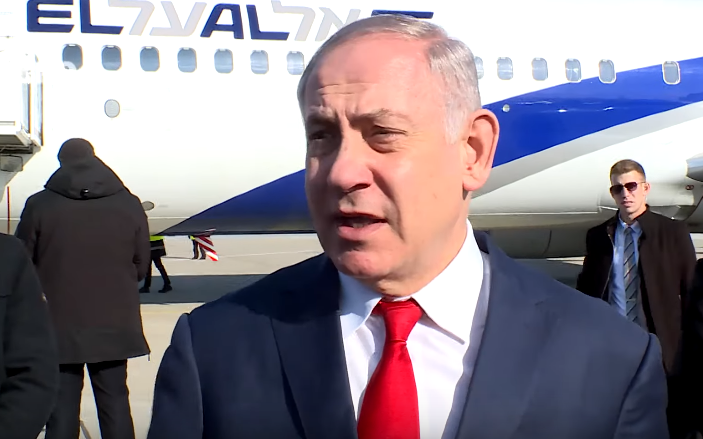
Israeli Prime Minister Binyamin Netanyahu (Source: The Times of Israel)
The West deeply divided on the issue of areas of influence since in the last century the United States forced the United Kingdom, France, Portugal and the Netherlands to liquidate their colonial empires legitimised by the 1884-85 Berlin Conference. The fake idea of a compact West is falling apart not on the grounds of a shared civilisation breaking but for geopolitical reasons. If anything, a shared civilisation would have resulted in recognising Russia as an integral part of Europe, according to the prophetic view of St. John Paul II. But the geopolitical events, you know, do not concern alleged civilisation identities. They concern economic interests, in a nutshell, who pays for what and whom, and who earns advantages for which offset.
Now the problem is that Europe, evidently different from an undifferentiated “West”, does not want to take note the U.S. has decided no soldier from Arkansas or Alaska will die to defend interests that are not its interests. That would entail a revision of the U.S. role in the World Wars and beyond. Perhaps, not to give peoples the freedom but to win over markets and control of resources. Meanwhile, it indeed lavished those development opportunities which the countries behind the Iron Curtain (roughly and euphemistically WWII co-winners) could never aspire to. In practice, Europe does not want to deal with its origin, and it claims protection from overseas.
The European Union stay on as a ghost. The debate rages among pro-Europeans, anti-Europeans and pro-European critics but with reservations, useful positions to score some electoral victory, except for failing promptly even the false premises which the improvised statesmen built their fortunes on. Europe is now invoked as the player who can resolve the situation but the distinctions already emerge between those who defend the past and those who demand reformist attitudes, or rather a revolution in its actions. Once again, inefficiency in analysis, inability to judge, indeed customary to give up.
The European Union is not a political entity. It hasn’t been since its inception and probably never will be. The institutions that led to the formation of the European Union were instrumental to building a Western bloc as opposed to then threatening USSR and therefore a clear and useful geopolitical implementation with both no decision-making (remained in the hands of governments) and military (left to NATO) autonomy. Just look at the correlation between European enlargement after the fall of the Berlin Wall and the corresponding progression of NATO membership. Until Ukraine’s misstep that Ukraine itself pays not the European Union… The statements of White House tenant regarding NATO exhausted role (part of his electoral program) have displaced European governments and think tanks, which like prudently not talk about, otherwise the end of their raison d’être.
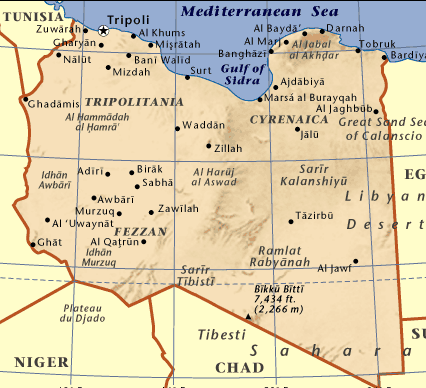 The same considerations apply to the worn debate between the pro-French and pro-Germans in European countries with higher delay in development or less geopolitical influence. It’s a false debate which however is indicative of the inconsistency not only of governments but of European public opinion. Coming around such partiality in souverainism times means backdate view to WWII or, worse, to WWI, and the old quarrel on the Alsace and Lorraine national memberships is not far away: a minefield for some countries if, for example, we talk about Libya, as someone suffers the historical nemesis of coming back to 1911 balance. It also means (and it may be correct) taking note that alliances “against” rather than “pro” are temporary but do not heal internal disputes. It means that, out of their borders, the structures resulting from the big conflicts cannot last forever (see Yugoslavia and Czechoslovakia, erased from the map). It means geopolitical importance of the nations does not depend on contingent political-institutional regimes (democracy, authoritarianism, dictatorship, monarchy, republic). Therefore, even though defeated in the past, they come back to the international scene under their structural ability to interpret the needs and interests of peoples they represent.
The same considerations apply to the worn debate between the pro-French and pro-Germans in European countries with higher delay in development or less geopolitical influence. It’s a false debate which however is indicative of the inconsistency not only of governments but of European public opinion. Coming around such partiality in souverainism times means backdate view to WWII or, worse, to WWI, and the old quarrel on the Alsace and Lorraine national memberships is not far away: a minefield for some countries if, for example, we talk about Libya, as someone suffers the historical nemesis of coming back to 1911 balance. It also means (and it may be correct) taking note that alliances “against” rather than “pro” are temporary but do not heal internal disputes. It means that, out of their borders, the structures resulting from the big conflicts cannot last forever (see Yugoslavia and Czechoslovakia, erased from the map). It means geopolitical importance of the nations does not depend on contingent political-institutional regimes (democracy, authoritarianism, dictatorship, monarchy, republic). Therefore, even though defeated in the past, they come back to the international scene under their structural ability to interpret the needs and interests of peoples they represent.
Is it complicated? So, let’s simplify. Libya issue. Putin-Erdoğan agreement. The two share Libya. It is not fair. It is against the free self-determination of peoples already enshrined by the Atlantic Charter. It is flawless. But the states today complaining about Libya agenda what were doing (and are, yet) in Iraq and Afghanistan? Do they share power and resources? It’s geopolitics, baby… Except you have to tell your people that the reasons are not ideal, that terrorism and human rights, religious options and base arising speculations have nothing to do with it. Economic and mostly energy interests have to do with it. The business of reconstructions has to do. Sometimes the control of illegal substances taken in the producing countries and consumed in its territory has, and so on.
You should also admit that in some European democracies the leaders of oil companies count today and counted in the past more than their mattered premiers and foreign ministers. When they don’t die killed like Italian Mattei. More or less with the same methods (but not with the same claims) as in Sulaimānī elimination.
So, a proxy war between Sarraj and Ḥaftar, today defended alternately by Erdoğan and Putin. But yesterday? The war in Libya did not break out for noble reasons related to Qaddāfī’s role. Only a few (including the writer) thought it was right to honour 1,270 Muslim Brothers massacred in the Abū Salīm prison by the controversial colonel (first labelled as a terrorist and then admitted to the exclusive club of American friends). Instead, the Italy-France contrast is at the root of the conflict. Eni and Total never appear in the smart comments of analysts, at least on the mass media. Macron is silent about it. Italy, as always cautious, prefers to calls for peace, invokes the spirit of E.U. unity, the demanded single voice. Which European single voice if in Libya there is an Italian-French proxy war? Troops on the ground? Sorry for daring. Today you can call them contractors. Someone calls them mercenaries it depends on the principals. Only Russians? Well, analysts should tell us… Or maybe it’s better not…

The Italian stance is a paradox. It claims rights over Libya. Correct, if interests are called rights. But, as we noted at the beginning, rights are an ethical concept. The same rights a year ago Italy denied to the Turkish ally (as a NATO member) on energy exploitation in the Eastern Mediterranean while agreeing with Sīsī’s Egypt in a perfect Eni-branded geo-economic understanding. Perhaps, today it is not a good idea to read the Putin-Erdoğan agreement as aimed at the partition of Libya. Perhaps it is not appropriate diplomatically equate Sarraj and Ḥaftar if you remember that the former is the result of activities of Italian diplomacy, yes, but riched by a tacit Turkey consent, which at the time defended Italian oil interests in Tripoli. Too comfortable if others pay.
Some reckless diplomats earlier accredited to the White House back this kind of fuddle still conveying misleading and anti-historical ideas and echoing slogans useful in the past to the dominant power for very contingent reasons. We relate to propaganda that still today useless ex-tenants of Farnesina offer against the Muslim Brothers, marked as terrorists just as they are supporting Italian national interests in Tripoli and Misrata. Betrayal of the Fatherland, one would have said decades ago. Once again, it’s about ethics, and someone might point out that the concept of honour is now out of time.
Ankara is loyal to Italy and its ally Sarraj, sending troops in the open and not contractors to those who asked for help. Of course, one must be able to afford it. And this is not the case with Italy, for sure due to restraints to freely exercise its foreign policy but that does not justify a “two horses’ policy”, which instead typifies the great powers. The debate on foreign policy is very scarce in Italy. While I’m writing these words, a former President of RAI, the state TV network, underlines on a state broadcast station that today there are important dates on the agenda. Right, we are waiting for news about the ongoing Berlin Conference, where Italy’s destinies in Libya are at stake. No way! The talented journalist refers to the meeting the Sardines movement (the Sardines, understand!) announced in Bologna and to the anniversary of former Prime Minister Craxi’s death in Tunisia twenty years ago.
The lack of interest in foreign policy is the result of the incapacity to deal with the issue, and you can understand why. For 75 years it was enough to follow White House-granted propaganda briefs that ensured the prosperity and well-being Washington gave to the Bel Paese. Today, Trump’s appeal to some allies to pay backdated NATO expenses for covering their security, caused a shock also to Palazzo Chigi and Farnesina but has helped to reveal who for 75 years has been paying for their prosperity and well-being. Other than nostalgia for the so-called First Republic…!
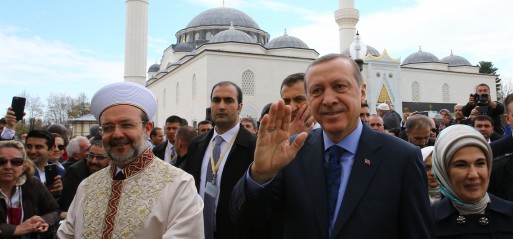 In Italy, criticism of Erdoğan [side photo] and its “repressive” policy spread, war correspondents multiply ready to condemn Ankara and his “Caliph” on all fronts, solidarity has offered to the anti-Turkish Kurds of PKK. One of the major TV broadcasters surprisingly named Tripoli as ex-capital of Libya. A former Prime Minister current partner of the majority coalition thunders: “Never the Turks in Libya”, recalling alleged historical merits of Italy for the unity of Libya. Apart the unity of Libya is due in historic times to Qaramanli and in recent times to the Islamic ṭarīqa Sanūsiyya, today without the Turks in Libya, Tripoli falls and hands over to Macron, who already controls the Sahel and most likely Fezzan, a strategic junction area between Maghreb and Tchad.
In Italy, criticism of Erdoğan [side photo] and its “repressive” policy spread, war correspondents multiply ready to condemn Ankara and his “Caliph” on all fronts, solidarity has offered to the anti-Turkish Kurds of PKK. One of the major TV broadcasters surprisingly named Tripoli as ex-capital of Libya. A former Prime Minister current partner of the majority coalition thunders: “Never the Turks in Libya”, recalling alleged historical merits of Italy for the unity of Libya. Apart the unity of Libya is due in historic times to Qaramanli and in recent times to the Islamic ṭarīqa Sanūsiyya, today without the Turks in Libya, Tripoli falls and hands over to Macron, who already controls the Sahel and most likely Fezzan, a strategic junction area between Maghreb and Tchad.
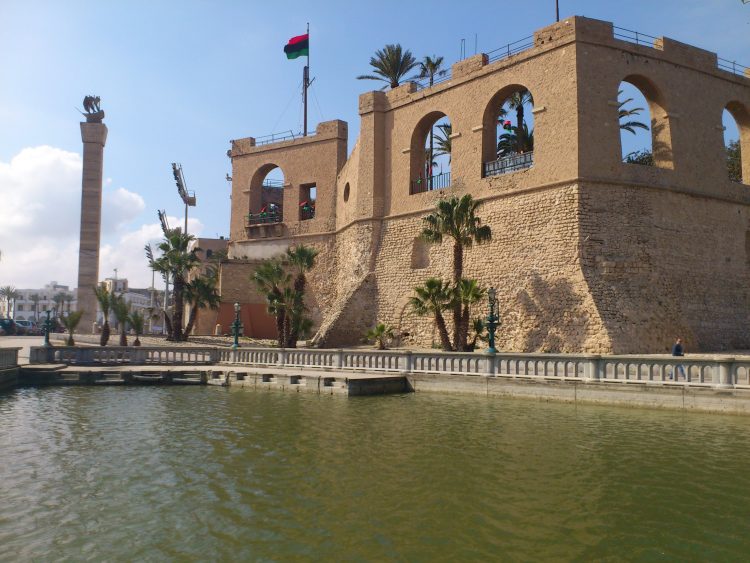
As-Saraya al-Hamra, the Red Castle of Tripoli
The Mosque of Algeria Square in Tripoli, the capital of Libya (photo by Abdul-Jawad Elhusuni)
What game is it? Do the various governments in Rome (right-wing, left-wing, but always a different one each year) realise that even the persistent press attitude, seldom rebutted by a half-note government reading, ends up sinking their international reliability? The perception of Italian foreign policy trusts on talk shows, tweets, ephemeral street interviews from questionable journalists. It means confusing public opinion about its interests, give up everything for an arduous “politically correct” but at the same time claiming solidarity when needed and jointly protagonism on the international arena.
Turkey, back from an anti-democratic coup attempt probably hatched by friendly countries, has finally ticked “politically correct” and has won its autonomous international role. Today, Ankara helps to deal with the cards, and it is no longer an anonymous actor used for supporting purposes of others. Its second most powerful NATO army can today ensure Turkey’s authority to contain the exuberance of Paris, which, via Brexit, is the only E.U. nuclear power.
Under its prerogative won in distant times and arrangements, I don’t see anyone who has had or still dares to consider the French troops or military bases throughout West Africa as “occupation forces” aimed at exploiting local resources. Nor many people who mentioned, for example, the monopolistic role of France and Great Britain in Gabon, Cameroon and Congo-Brazzaville. In the former, French Total, Anglo-Dutch Shell and Anglo-French Perenco together make up 80% of total oil national production; in the latter countries, again Total holds a 70% share in each of them. Nobody thinks the French military interventions in Mali or Ivory Coast were the result of neo-imperialism, and woe to evoke Françafrique or alleged claims to maintain its political, economic and military influence. Those operations naturally framed in stabilising the region, especially after the attacks of a shadowy militant Islamism that had to be, with everyone’s consent, blocked and punished.
G5 Sahel, which has anti-terrorism and security purposes, is a result of French diplomacy. Paris proposed this institutional coordination framework to the U.N. Security Council (where it is a permanent member with a veto right) that approved it. All papers are in order and hence not only France but also the European Union rightly funds it. Not to mention the uranium mines in Niger. They are a French national legitimate interest, recognised because of its untouchable nuclear military status. It’s not the same status as the Islamic Republic of Iran that asks just nuclear power for civilian purposes. But, as we all know (or maybe not), Iran held neutral and pacifist stances in both World Wars, and it must face the consequences.
Let me be clear. This is not a charge to France since I follow my starting approach not to give ethical verdicts. On the contrary. It is a photo of a geopolitical framework that certifies the prestige of a nation not only imposing its interests as essential priorities but having the strength to make them recognised by the supranational entity to which it belongs. Speaking about Italy, the awareness of not being able to follow the same path, as a defeated nation and tributary of primary interests of others, should advise it to seek other solutions.
It seems obvious we don’t claim to suggest those solutions. But sometimes knowing how to recognise the right road companions in the current chaotic geopolitical situation, those who can be at least useful for achieving your own strategic economic goals, helps not to fall into a periodic stalemate. Especially in domestic politics, considered as a tool to win local power and infrequently to strengthen its international credibility.
As long as we assume you have a wide-ranging strategy and long-term planning!


